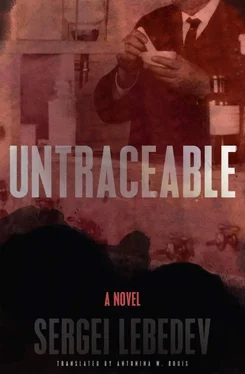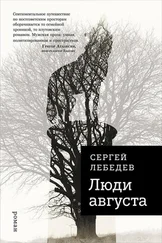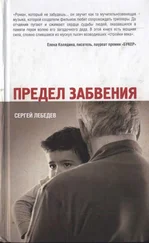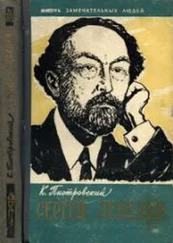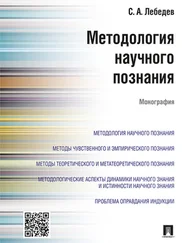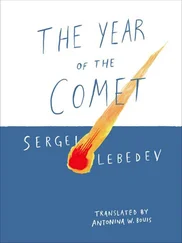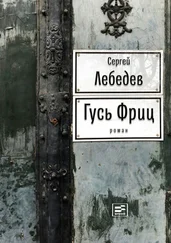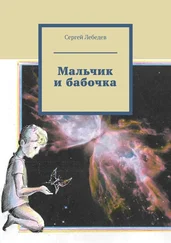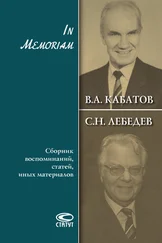Сергей Лебедев - Untraceable
Здесь есть возможность читать онлайн «Сергей Лебедев - Untraceable» весь текст электронной книги совершенно бесплатно (целиком полную версию без сокращений). В некоторых случаях можно слушать аудио, скачать через торрент в формате fb2 и присутствует краткое содержание. Город: New York, Год выпуска: 2021, ISBN: 2021, Издательство: New Vessel Press, Жанр: Современная проза, на английском языке. Описание произведения, (предисловие) а так же отзывы посетителей доступны на портале библиотеки ЛибКат.
- Название:Untraceable
- Автор:
- Издательство:New Vessel Press
- Жанр:
- Год:2021
- Город:New York
- ISBN:978-1-939931-90-0
- Рейтинг книги:3 / 5. Голосов: 1
-
Избранное:Добавить в избранное
- Отзывы:
-
Ваша оценка:
- 60
- 1
- 2
- 3
- 4
- 5
Untraceable: краткое содержание, описание и аннотация
Предлагаем к чтению аннотацию, описание, краткое содержание или предисловие (зависит от того, что написал сам автор книги «Untraceable»). Если вы не нашли необходимую информацию о книге — напишите в комментариях, мы постараемся отыскать её.
Untraceable — читать онлайн бесплатно полную книгу (весь текст) целиком
Ниже представлен текст книги, разбитый по страницам. Система сохранения места последней прочитанной страницы, позволяет с удобством читать онлайн бесплатно книгу «Untraceable», без необходимости каждый раз заново искать на чём Вы остановились. Поставьте закладку, и сможете в любой момент перейти на страницу, на которой закончили чтение.
Интервал:
Закладка:
“We have to wait. We’ll bullshit our way out of it,” said Shershnev.
He was seething inside. The laughter was replaced almost instantly by fury, to which he could not succumb; but he couldn’t suppress it either, only postpone it, and Shershnev promised himself, soon, soon you will be able to feel it.
The police came about twenty minutes later; it felt like an hour. They exchanged a few words with the driver of the red car and came over to them.
“He was backing up on the highway. It’s not our fault,” Shershnev began in English.
“Yes, yes, we know,” the policeman responded with some surprise at his aggressiveness. “The driver at fault reported it. He called us to write up a report for the rental company.”
Grebenyuk winked.
The report was written quickly. They took a few photos of the damaged fender with their iPhones. The officer, a young provincial cop with good school English, asked as he returned their documents in a bored manner, looking for something to distract him from work, “Where are you headed?”
They had the rehearsed reply to fit their cover. There were no usual tourist sites near the subject’s residence, no castles, thermal springs, or canyons with observation platforms. There was only one spot. The embassy people went there every year to lay wreaths. So they proposed it.
“The museum,” said Shershnev. “You know, the memorial…”
“You’ve passed it,” said the cop with animation. “We can show you the road, we’re headed in that direction anyway.”
Shershnev didn’t risk telling him that they’ve already been there—what if the driver had told them they had already met on the road? The odometer would not match their mileage. He was at a loss for an answer, trapped by the excessive amiability, idiotic readiness to help. One cretin called the police to take care of them. Other cretins were now going to accompany them. Why didn’t they just leave them alone? And what made him say that? He could have avoided an answer. Everything seemed fine, but words are like instant glue, holding so that you can’t tear away.
“Thank you,” Shershnev said. “We’d be grateful.”
“What’s the matter with you?” Grebenyuk whispered in the car. “What the fuck do we need this for?”
“How could I refuse?” Shershnev answered in irritation, angered by his mistake. “Say, oh, we changed our mind? Let’s go back? We can’t be memorable. We have to behave the way they expect. I remember the map. It’s not far. We’ll zip over and back. Quick trip.”
“They’re hard to understand,” Grebenyuk insisted. “Can you imagine our cops behaving this way?”
“This is Europe,” Shershnev said. “Get used to it.”
CHAPTER 18
Kalitin awoke long past noon. His head was clear, even though he had drunk over half a bottle of cognac. In the shower, he decided to leave tomorrow, not today. Clean out the computer, burn some papers in the evening. Make very sure that the container of Neophyte was ready for the trip, and could withstand bouncing on the road, unexpected falls, jolts, or bangs.
The perfume bottle had been kept for decades in the safe. Kalitin, deprived of a laboratory, could not move Neophyte into a more reliable vessel. He couldn’t even check the container: Was the valve intact? The technicians on the Island had promised that the loaded bottle would remain hermetically sealed forever. But Kalitin remembered his wife’s fate and was extra careful.
The refrigerator was empty, and he had not been in the mood for food on the way home yesterday. He decided to have lunch in the village. An omelet with sausage and cracklings, invigorating tea with ginger. Then home and a nap for a couple of hours, followed by a hot and cold shower. Coffee. That would take away the feebleness in his fingers, sharpen his mind, and he could carefully pack Neophyte, that capricious and dangerous child, into the transportation box.
He drove the usual way past the church and turned toward the river. The restaurant was empty, people here kept country hours for meals. Kalitin went to the far terrace over the deep waters of the mill, where silvery trout stayed in the slow circling water, catching flies and bugs from the surface. They knew him here, and made the omelet the way he liked it—without over-cooking the bacon, adding sweet peppers, and he was sorry he would have to leave all this.
Behind him came professionally polite steps: must be the landlady. She often brought him something on the house, strudel or crepes with jam.
But it was Travniček. Black cassock, expressionless face. Kalitin shuddered.
“Forgive me,” said that pastor. “Good morning. May I speak with you?”
It must be the roof or stained glass windows again, Kalitin thought with regret. When it came to repairs, Travniček was unbearable. “Why do you get so upset,” someone said to him once. “The church has been here six hundred years and will be there six hundred more.”
“It is God’s House,” Travniček replied loftily, as if he really thought that God lived in that stone barn.
“Of course. Would you like some tea?” Kalitin decided to have some fun before leaving and maybe even give him money, let the ridiculous priest enjoy an unexpected victory.
“Thank you.” The pastor sat down, adjusting his cassock with a fussy, feminine gesture. “You drove past yesterday, I waved to you, but you did not stop.”
It’s starting, Kalitin thought. What broke or leaked this time?
“I was just about to go to your place, but here you are. That’s a good sign.”
Something new, Kalitin told himself. The extortionist never went door-to-door before.
“You see, while you were away… People came to your house. Agents. External surveillance.”
“Agents? To my house?” Kalitin did not quite understand what he had said.
He looked at the awkward pastor, his plump hands with infrequent colorless hairs, his flabby breasts—must be hormonal, he thought—beneath the cassock. A miracle of nature!
“Yes. To you,” the pastor replied simply.
“Pastor, you imagined it.” Kalitin spoke sincerely. “What agents? What am I, a spy? Must have been some tourists who got lost. You’ve been watching too much television.”
But inside, it was as if a glass rod used in mixing reagents had snapped.
“You haven’t asked whom I saw,” Travniček said with a small smile. “Fine. I won’t insist. But I will explain for your own good why I cannot make a mistake. I don’t like talking about it, but… I spent nineteen years under surveillance. In the country that no longer exists, thank God. Every day. In church. On the street. In the store. I know their breed all too well. Looks. Manners. Methods. So, they were agents. People from my past. However, this time with Slavic faces.”
Kalitin could hear the water rushing in the stones. The pastor’s sentences were dissolving, lost behind the roar that had grown suddenly and threateningly.
The house. The container with Neophyte. The unfinished omelet on his plate. The plans for tomorrow—it all fell away. Now there was only his body, aged, weak, so easily shot with a bullet.
No, no, there would be no bullet, Kalitin thought in impotent horror. They would send someone with Neophyte. That would be like them.
The very thought that Neophyte was somewhere nearby, in someone else’s hands, made Kalitin dizzy. He remembered Vera’s blue, inhuman face. Why hadn’t he destroyed all the other samples before he defected? He had been in the lab. He couldn’t do it. He was sorry.
“How long ago?” Kalitin asked, controlling himself. He hoped it was yesterday or the day before, which meant he had plenty of time.
“Nine days ago,” Travniček replied. “Alas. I didn’t know where to call you. I think they reported that no one had seen them. It’s amazing but people often don’t notice priests. We are an anachronism for them. Do you have a place to go?”
Читать дальшеИнтервал:
Закладка:
Похожие книги на «Untraceable»
Представляем Вашему вниманию похожие книги на «Untraceable» списком для выбора. Мы отобрали схожую по названию и смыслу литературу в надежде предоставить читателям больше вариантов отыскать новые, интересные, ещё непрочитанные произведения.
Обсуждение, отзывы о книге «Untraceable» и просто собственные мнения читателей. Оставьте ваши комментарии, напишите, что Вы думаете о произведении, его смысле или главных героях. Укажите что конкретно понравилось, а что нет, и почему Вы так считаете.
